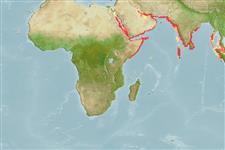>
Pleuronectiformes (Flatfishes) >
Cynoglossidae (Tonguefishes) > Cynoglossinae
Etymology: Cynoglossus: Greek, kyon = dog + Greek, odous = teeth + Greek, glossa = tongue (Ref. 45335).
More on author: Alcock.
Environment: milieu / climate zone / depth range / distribution range
Οικολογία
Θαλασσινό(ά) βαθύβιο(ς); εύρος βάθους 27 - 420 m (Ref. 5297). Deep-water
Indian Ocean: seas of India to Persian Gulf. Cynoglossus carpenteri is closely related to Cynoglossus acutirostris.
Μέγεθος / Βάρος / Age
Maturity: Lm ? range ? - ? cm
Max length : 23.0 cm TL αρσενικό/απροσδιόριστο; (Ref. 11441)
Trawled from a depth of 124-420 m (Ref. 5297).
Life cycle and mating behavior
Maturities | Αναπαραγωγή | Spawnings | Egg(s) | Fecundities | Προνύμφες
Menon, A.G.K., 1977. A systematic monograph of the tongue soles of the genus Cynoglossus Hamilton-Buchanan (Pisces: Cynoglossidae). Smithson. Contrib. Zool. (238):1-129. (Ref. 5297)
IUCN Red List Status (Ref. 130435)
Threat to humans
Harmless
Human uses
Εργαλεία
Special reports
Download XML
Διαδικτυακές πηγές
Estimates based on models
Preferred temperature (Ref.
123201): 15.4 - 25.8, mean 22.3 °C (based on 98 cells).
Phylogenetic diversity index (Ref.
82804): PD
50 = 0.5000 [Uniqueness, from 0.5 = low to 2.0 = high].
Bayesian length-weight: a=0.01122 (0.00514 - 0.02450), b=3.04 (2.87 - 3.21), in cm total length, based on all LWR estimates for this body shape (Ref.
93245).
Τροφικό Επίπεδο (Ref.
69278): 3.4 ±0.4 se; based on size and trophs of closest relatives
Ελαστικότητα (Ref.
120179): Υψηλό, ελάχιστος χρόνος για διπλασιασμό πληθυσμού < 15 μήνες (Preliminary K or Fecundity.).
Fishing Vulnerability (Ref.
59153): Low vulnerability (13 of 100).
